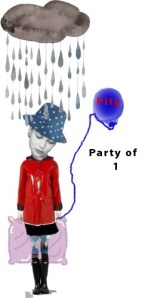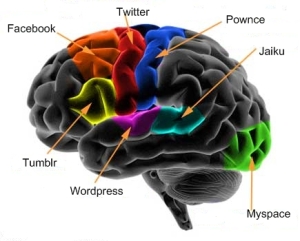Have you ever been disappointed by something during your day that really got to you and made you want to stay late at your own pity party?

You get that brief stare
that could almost cut anything in half for crossing your gaze.

It happened to me a few minutes ago and although I hadn’t scheduled any blogging today, I had to share one thing I do about disappointment with everybody.
It is pretty funny (funny odd, not exactly laughable) but when I get disappointed about something I was counting on, I can’t help but think about a fortune I got in a fortune cookie in the 90’s. Yes, I still remember it, as it was before I stopped caring too much for the flavor of the actual cookie. So as I finished chomping on the [at that time] delicious cookie, I read my fortune out loud to my family. This was because, of course, the fortunes that were read to everyone at the table were the ones that come true (according to our own ‘house rules’). And I guess mine came true after all. It said:
“Your future will hold only small disappointments.”
And then, my lucky numbers – which I would have played had I not been so young – were on the back.
This glorious fortune was somewhat of a disappointment in itself. As the youngest child, I had to emit a loud sigh on the short car ride home. “My fortune was depressing!” But then my Father suggested this great theory that stuck with me all of these years. I think of it every time I’m disappointed about anything. Let’s see if I can explain it half as well as my well-spoken Father did for me…
At the time, this fortune was a big disappointment to my young mind in comparison to my sister’s fortune (which had something written on it about a pretty garden. Yes, I know, it is rather creepy that I still remember her fortune too. Let’s see past that for a minute). But in comparison to all the personal disappointments in one lifetime, reading this rectangular note of wisdom, as my dear Dad explained, would become little more than a fleeting moment. We had known a thing or two about major setbacks already in life at this point, as we were still struggling over some major and unexpected hurdles for our family. He insisted that in ten years or even five years from that day, I wouldn’t even recall going out to Happy Family and that so far, only thirty minutes after getting a gloomy prediction in my cookie, the fortune was correct. It was only a small disappointment.
What would be a big disappointment? That’s mostly relative to the person having the experience. But I can think of a few which would be considered as big disappointments for me at this point in my life:
– Breaking a bone or getting terribly sick right before a long awaited exotic vacation
– Missing someone who lives too far away to visit
– Breaking up with my best friend whom I’ve known longer than any friend I’ve ever had. (That’s actually a recent disappointment of mine but I’ll save the whole story for another time.)
– Losing a fantastic job
– Getting robbed (well, I’m sure it would matter more if I currently had more than I do but you know what I mean.)
– Losing a loved one
– Getting two kinds of unshakable flu during college finals (true story, it was horrific.)
– Oh and don’t even mention a hurricane hitting. That’s just an understood at this point. (Fanatic hurricane Ike and Rita hater, right here!) I think that would go into the group of “Huge Disappointments”
So basically, in my life I can narrow down what would be big disappointments to a short list of basic concepts:
– Deep heartbreak – losing hold of a cherished friendship or maybe even experiencing the death of a close friend or family member.
– Loss of security
– Losing health needed to pursue life goals – which is rather like loss of security
Anything other than what might fit in those three relatively unlikely categories, for me, are removed from the classification of big disappointment. For the most part, anything outside of the “big disappointment” group (which would be almost any typical blunder or disturbing event) is considered a small disappointment (in my eyes). Contrary to my original reaction in the 90’s, this as anything but depressing.
My Dad explained it so well that day, I wish I could have recorded it but here’s what I retained from his fatherly wisdom:

Small disappointments help us grow. They also help to enhance the feeling that we get from our accomplishments. If everything we wanted came easily, how would we know what to feel really good about? There’s no way. We wouldn’t know. When roadblocks get in the way and we need to come up with alternate routes to get back on our paths, the experience we get from struggling through or rethinking our plans strengthens us for the road ahead. The small disappointments make us better people by forcing us to learn how to leap over them. It’s the big disappointments that can be catastrophic unless it is possible to see them as just a cluster of little obstacles glued together. Overcoming big disappointments is what can either make a person or break them. So you’d better hope that all the little ones have been a good preparation if/when a big problem hits.
Because of that one fortune, which I found inside its crunchy cookie case one day, I can put those little disenchanting moments – typically discovered on Mondays – into perspective. I think, “Will this affect me five years from now? How about ten years from now?
Usually, I stop there and shrug off the frustration but sometimes, if I say yes to those two questions, I consider my problem even more. “ If this could affect me years from now and impede on my quality of life, could it possibly affect me positively?
Now, occasionally, things do happen and if there is a big disappointment, working through it can be counted as a personal investment in my future. Self improvement is certainly worth the trouble. If it’s a normal day, thankfully it usually is, and if I only have a slight Homer Simpson moment (Doh’), I think of the fortune cookie and laugh to myself, thankful for the small disappointments.
















